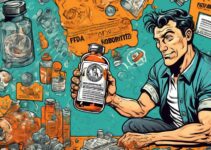So, you're curious about the global regulations surrounding nootropic supplements. You might be surprised to learn that there's quite a variety of approaches to regulating these cognitive enhancers around the world. From the strict guidelines in the US to the more flexible regulations in certain parts of Asia, the landscape of nootropic regulation is quite diverse. Understanding these regulations is essential for anyone interested in the use and distribution of these supplements, and it could have a significant impact on your access to them.
Key Takeaways
- The US FDA regulates dietary supplements, including nootropics, under the DSHEA of 1994, but does not evaluate their effectiveness before they are marketed.
- The European Union has stricter regulations on nootropic substances, requiring thorough scientific evaluation and prioritizing safety and efficacy.
- Asian countries have varying classifications and controls on nootropic substances, influenced by cultural attitudes and traditional medicine.
- Australia's TGA enforces strict guidelines on the importation, manufacturing, labeling, and quality of nootropic supplements to ensure safety and efficacy.
US Regulations on Nootropic Substances
When it comes to nootropic substances, the US regulatory framework is complex and ever-evolving. The market for dietary supplements in the United States is extensive, and nootropics fall within this category. The US Food and Drug Administration (FDA) regulates the production and sale of dietary supplements, including nootropics, under the Dietary Supplement Health and Education Act (DSHEA) of 1994. Under DSHEA, these products are considered as food and are not subject to the same rigorous testing and approval process as pharmaceutical drugs. However, the FDA does have the authority to take action against any dietary supplement found to be unsafe or misbranded after it reaches the market.
It's essential to note that the FDA does not evaluate the effectiveness of dietary supplements before they are marketed. Instead, the responsibility falls on the manufacturer to ensure the safety and efficacy of their products. This self-regulation has led to concerns regarding the quality and consistency of nootropic supplements available in the market. Additionally, the evolving nature of the regulatory framework means that the specific requirements for labeling, manufacturing, and marketing of nootropic substances can change over time.
As a consumer, it is crucial to be well-informed about the regulatory context surrounding nootropic supplements. Understanding the US FDA regulations and staying updated on any developments can help you make informed decisions when considering the use of these products.
European Union Regulations on Nootropic Substances
Navigating the regulatory landscape for nootropic substances in the European Union presents a distinct set of considerations following the complexity of US regulations. The European Union guidelines on nootropic substances are governed by the European Food Safety Authority (EFSA), which evaluates and approves the use of new substances based on scientific evidence. Here are some key points to consider regarding European Union regulations on nootropic substances:
- EFSA Evaluation: Unlike the US, where the FDA has a more hands-on approach to regulating dietary supplements, the EFSA takes a cautious stance, requiring thorough scientific evaluation before approving the use of new nootropic substances.
- Scientific Evidence: European Union guidelines prioritize scientific evidence of nootropic safety and efficacy, necessitating comprehensive studies and clinical trials to support the approval of these substances for consumer use.
- Limited Approved Substances: The European Union has a shorter list of approved nootropic substances compared to the US, reflecting a more stringent approach to ensuring the safety and efficacy of these supplements.
Asian Regulations on Nootropic Substances
In Asia, regulations regarding the use of nootropic substances vary widely among different countries, making it important to understand the specific requirements in each market. Regulatory challenges exist due to the differing approaches to the classification and control of nootropic substances. For example, in some Asian countries, certain nootropics may be classified as prescription drugs, while in others they may be available over the counter or completely unregulated. This can create challenges for both consumers and businesses looking to navigate the diverse regulatory landscape in Asia.
Cultural attitudes towards nootropic substances also play a significant role in shaping regulations. In some Asian societies, there may be a more conservative approach to cognitive enhancement, leading to stricter regulations and oversight of these substances. On the other hand, in countries where traditional medicine is highly valued, there may be more openness to the use of certain natural nootropics, which could impact the regulatory framework.
Navigating the complex and varied regulatory environment for nootropic substances in Asia requires a deep understanding of each country's specific laws and cultural attitudes. Businesses operating in the region must carefully assess the regulatory landscape and adapt their strategies to comply with diverse requirements. Likewise, consumers should be aware of the legal status and cultural perceptions of nootropics in their respective countries to ensure safe and legal use.
Australian Regulations on Nootropic Substances
Are nootropic substances in Australia regulated differently than in other countries? The Australian nootropic market is subject to regulations set by the Therapeutic Goods Administration (TGA), which oversees the import, manufacturing, and labeling of therapeutic goods, including nootropic supplements. Here are some key points to consider about Australian regulations on nootropic substances:
- TGA Regulations: The TGA regulates the entry of nootropic substances into the Australian market. Nootropic products must undergo a thorough evaluation process to ensure their safety, quality, and efficacy before they can be legally sold in Australia. This process involves rigorous testing and assessment to meet the TGA's standards for therapeutic goods.
- Nootropic Import Restrictions: Importing nootropic substances into Australia is also tightly regulated. The TGA enforces strict guidelines on the importation of therapeutic goods, including nootropic supplements. Importers must adhere to the TGA's requirements and obtain necessary approvals before bringing these products into the country.
- Market Compliance: Once a nootropic supplement is approved for sale in Australia, it must comply with ongoing TGA regulations regarding manufacturing practices, advertising, and product quality. This ensures that nootropic supplements available in the Australian market meet the necessary standards for safety and efficacy.
South American Regulations on Nootropic Substances
South American countries implement diverse regulatory frameworks for the oversight of nootropic substances, impacting their availability and marketing. South American restrictions on nootropic substances vary widely across different countries in the region. For instance, some countries have stringent regulations in place, requiring nootropic products to undergo thorough testing and approval before they can be sold to the public. Import/export policies for nootropic substances also differ among South American countries, with some nations imposing strict limitations on the importation and exportation of these products.
In some South American countries, specific regulatory authorities oversee the importation of nootropic substances, ensuring that only approved products enter the market. These authorities set standards for the quality and safety of nootropic supplements, which must be met before the products can be imported or sold within the country. Importers and manufacturers of nootropic supplements in South America must navigate these regulations to ensure compliance with the varying restrictions in place across different countries.
Due to the differences in regulatory oversight and import/export policies, the availability and marketing of nootropic substances can vary significantly from one South American country to another. It is essential for businesses operating in the region to thoroughly understand and adhere to the specific regulatory requirements of each country to navigate the complex landscape of selling and distributing nootropic supplements in South America.
Frequently Asked Questions
What Are the Potential Long-Term Health Effects of Using Nootropic Supplements?
Using nootropic supplements for cognitive enhancement may pose potential risks to your long-term health. While these supplements may offer short-term benefits, prolonged use could lead to adverse effects such as insomnia, headaches, and increased blood pressure. Additionally, some research suggests that certain nootropics may impact neurotransmitter levels, potentially affecting mood and mental health in the long run. It's important to consider these potential risks before using such supplements regularly.
Are There Any International Organizations or Treaties That Regulate the Use of Nootropic Substances Across Multiple Regions?
Internationally, various organizations and treaties oversee regulations on nootropic substances, ensuring cross-regional compliance. These global frameworks monitor the use and distribution of nootropic supplements, promoting safety and standardization. These international organizations work together to establish guidelines and enforce regulations, aiming to harmonize the approach to managing nootropic substances across different regions. With their concerted efforts, they strive to create a cohesive and consistent regulatory environment for nootropic supplements worldwide.
How Do Regulations on Nootropic Substances Differ Between Prescription and Over-The-Counter Products in Different Regions?
Regulations on nootropic substances vary by region, affecting both prescription and over-the-counter products. In some areas, prescription nootropics are tightly controlled due to their potential for abuse, while over-the-counter options may have less stringent regulations. However, these rules can differ significantly from one country to another. Understanding these regional disparities is crucial when considering the availability and legal status of nootropic supplements.
What Are the Regulations Surrounding the Marketing and Advertising of Nootropic Supplements in Various Global Markets?
When it comes to marketing and advertising nootropic supplements globally, regulatory compliance is crucial. Different markets have varying rules, so understanding the landscape is key. Navigating these regulations can be challenging, but it's essential to ensure your marketing strategies are compliant. From labeling requirements to advertising restrictions, staying informed and adaptable is imperative for successfully promoting your products in diverse markets.
Are There Any Specific Regulations or Restrictions on the Import and Export of Nootropic Substances Between Different Countries?
When importing or exporting nootropic substances, you should be aware of regulatory differences and trade restrictions between countries. Some nations may have specific regulations on the import and export of these supplements, which could impact your ability to trade them internationally. It's essential to research and understand the specific requirements and restrictions in each country to ensure compliance and smooth trade operations.
Conclusion
So, as you can see, global regulations on nootropic supplements vary widely. While some countries have strict regulations in place, others have more relaxed approaches. It's important to be aware of the regulations in your specific region before purchasing or using any nootropic substances. Whether you're in the US, Europe, Asia, Australia, or South America, make sure to stay informed and stay safe when it comes to using these cognitive enhancers.



